- Home
- Henry James
The Pupil Page 4
The Pupil Read online
Page 4
“You pause for a reply,” said Pemberton, treating the question as a joke, yet wondering too and greatly struck with his mate’s intense if imperfect vision. “I haven’t the least idea.”
“And what good does it do? Haven’t I seen the way people treat them - the ‘nice’ people, the ones they want to know? They’ll take anything from them - they’ll lie down and be trampled on. The nice ones hate that - they just sicken them. You’re the only really nice person we know.”
“Are you sure? They don’t lie down for me!”
“Well, you shan’t lie down for them. You’ve got to go - that’s what you’ve got to do,” said Morgan.
“And what will become of you?”
“Oh I’m growing up. I shall get off before long. I’ll see you later.”
“You had better let me finish you,” Pemberton urged, lending himself to the child’s strange superiority.
Morgan stopped in their walk, looking up at him. He had to look up much less than a couple of years before - he had grown, in his loose leanness, so long and high. “Finish me?” he echoed.
“There are such a lot of jolly things we can do together yet. I want to turn you out - I want you to do me credit.”
Morgan continued to look at him. “To give you credit - do you mean?”
“My dear fellow, you’re too clever to live.”
“That’s just what I’m afraid you think. No, no; it isn’t fair - I can’t endure it. We’ll separate next week. The sooner it’s over the sooner to sleep.”
“If I hear of anything - any other chance - I promise to go,” Pemberton said.
Morgan consented to consider this. “But you’ll be honest,” he demanded; “you won’t pretend you haven’t heard?”
“I’m much more likely to pretend I have.”
“But what can you hear of, this way, stuck in a hole with us? You ought to be on the spot, to go to England - you ought to go to America.”
“One would think you were MY tutor!” said Pemberton.
Morgan walked on and after a little had begun again: “Well, now that you know I know and that we look at the facts and keep nothing back - it’s much more comfortable, isn’t it?”
“My dear boy, it’s so amusing, so interesting, that it will surely be quite impossible for me to forego such hours as these.”
This made Morgan stop once more. “You DO keep something back. Oh you’re not straight - I am!”
“How am I not straight?”
“Oh you’ve got your idea!”
“My idea?”
“Why that I probably shan’t make old - make older - bones, and that you can stick it out till I’m removed.”
“You ARE too clever to live!” Pemberton repeated.
“I call it a mean idea,” Morgan pursued. “But I shall punish you by the way I hang on.”
“Look out or I’ll poison you!” Pemberton laughed.
“I’m stronger and better every year. Haven’t you noticed that there hasn’t been a doctor near me since you came?”
“I’M your doctor,” said the young man, taking his arm and drawing him tenderly on again.
Morgan proceeded and after a few steps gave a sigh of mingled weariness and relief. “Ah now that we look at the facts it’s all right!”
CHAPTER VII
They looked at the facts a good deal after this and one of the first consequences of their doing so was that Pemberton stuck it out, in his friend’s parlance, for the purpose. Morgan made the facts so vivid and so droll, and at the same time so bald and so ugly, that there was fascination in talking them over with him, just as there would have been heartlessness in leaving him alone with them. Now that the pair had such perceptions in common it was useless for them to pretend they didn’t judge such people; but the very judgement and the exchange of perceptions created another tie. Morgan had never been so interesting as now that he himself was made plainer by the sidelight of these confidences. What came out in it most was the small fine passion of his pride. He had plenty of that, Pemberton felt - so much that one might perhaps wisely wish for it some early bruises. He would have liked his people to have a spirit and had waked up to the sense of their perpetually eating humble-pie. His mother would consume any amount, and his father would consume even more than his mother. He had a theory that Ulick had wriggled out of an “affair” at Nice: there had once been a flurry at home, a regular panic, after which they all went to bed and took medicine, not to be accounted for on any other supposition. Morgan had a romantic imagination, led by poetry and history, and he would have liked those who “bore his name” - as he used to say to Pemberton with the humour that made his queer delicacies manly - to carry themselves with an air. But their one idea was to get in with people who didn’t want them and to take snubs as it they were honourable scars. Why people didn’t want them more he didn’t know - that was people’s own affair; after all they weren’t superficially repulsive, they were a hundred times cleverer than most of the dreary grandees, the “poor swells” they rushed about Europe to catch up with. “After all they ARE amusing - they are!” he used to pronounce with the wisdom of the ages. To which Pemberton always replied: “Amusing - the great Moreen troupe? Why they’re altogether delightful; and if it weren’t for the hitch that you and I (feeble performers!) make in the ensemble they’d carry everything before them.”
What the boy couldn’t get over was the fact that this particular blight seemed, in a tradition of self-respect, so undeserved and so arbitrary. No doubt people had a right to take the line they liked; but why should his people have liked the line of pushing and toadying and lying and cheating? What had their forefathers - all decent folk, so far as he knew - done to them, or what had he done to them? Who had poisoned their blood with the fifth-rate social ideal, the fixed idea of making smart acquaintances and getting into the monde chic, especially when it was foredoomed to failure and exposure? They showed so what they were after; that was what made the people they wanted not want THEM. And never a wince for dignity, never a throb of shame at looking each other in the face, never any independence or resentment or disgust. If his father or his brother would only knock some one down once or twice a year! Clever as they were they never guessed the impression they made. They were good-natured, yes - as good-natured as Jews at the doors of clothing-shops! But was that the model one wanted one’s family to follow? Morgan had dim memories of an old grandfather, the maternal, in New York, whom he had been taken across the ocean at the age of five to see: a gentleman with a high neck-cloth and a good deal of pronunciation, who wore a dress-coat in the morning, which made one wonder what he wore in the evening, and had, or was supposed to have “property” and something to do with the Bible Society. It couldn’t have been but that he was a good type. Pemberton himself remembered Mrs. Clancy, a widowed sister of Mr. Moreen’s, who was as irritating as a moral tale and had paid a fortnight’s visit to the family at Nice shortly after he came to live with them. She was “pure and refined,” as Amy said over the banjo, and had the air of not knowing what they meant when they talked, and of keeping something rather important back. Pemberton judged that what she kept back was an approval of many of their ways; therefore it was to be supposed that she too was of a good type, and that Mr. and Mrs. Moreen and Ulick and Paula and Amy might easily have been of a better one if they would.
But that they wouldn’t was more and more perceptible from day to day. They continued to “chivey,” as Morgan called it, and in due time became aware of a variety of reasons for proceeding to Venice. They mentioned a great many of them - they were always strikingly frank and had the brightest friendly chatter, at the late foreign breakfast in especial, before the ladies had made up their faces, when they leaned their arms on the table, had something to follow the demitasse, and, in the heat of familiar discussion as to what they “really ought” to do, fell inevitably into the languages in which they could tutoyer. Even Pemberton liked them then; he could endure even Ulick when he heard him give his lit
tle flat voice for the “sweet sea-city.” That was what made him have a sneaking kindness for them - that they were so out of the workaday world and kept him so out of it. The summer had waned when, with cries of ecstasy, they all passed out on the balcony that overhung the Grand Canal. The sunsets then were splendid and the Dorringtons had arrived. The Dorringtons were the only reason they hadn’t talked of at breakfast; but the reasons they didn’t talk of at breakfast always came out in the end. The Dorringtons on the other hand came out very little; or else when they did they stayed - as was natural - for hours, during which periods Mrs. Moreen and the girls sometimes called at their hotel (to see if they had returned) as many as three times running. The gondola was for the ladies, as in Venice too there were “days,” which Mrs. Moreen knew in their order an hour after she arrived. She immediately took one herself, to which the Dorringtons never came, though on a certain occasion when Pemberton and his pupil were together at St. Mark’s - where, taking the best walks they had ever had and haunting a hundred churches, they spent a great deal of time - they saw the old lord turn up with Mr. Moreen and Ulick, who showed him the dim basilica as if it belonged to them. Pemberton noted how much less, among its curiosities, Lord Dorrington carried himself as a man of the world; wondering too whether, for such services, his companions took a fee from him. The autumn at any rate waned, the Dorringtons departed, and Lord Verschoyle, the eldest son, had proposed neither for Amy nor for Paula.
One sad November day, while the wind roared round the old palace and the rain lashed the lagoon, Pemberton, for exercise and even somewhat for warmth - the Moreens were horribly frugal about fires; it was a cause of suffering to their inmate - walked up and down the big bare sala with his pupil. The scagliola floor was cold, the high battered casements shook in the storm, and the stately decay of the place was unrelieved by a particle of furniture. Pemberton’s spirits were low, and it came over him that the fortune of the Moreens was now even lower. A blast of desolation, a portent of disgrace and disaster, seemed to draw through the comfortless hall. Mr. Moreen and Ulick were in the Piazza, looking out for something, strolling drearily, in mackintoshes, under the arcades; but still, in spite of mackintoshes, unmistakeable men of the world. Paula and Amy were in bed - it might have been thought they were staying there to keep warm. Pemberton looked askance at the boy at his side, to see to what extent he was conscious of these dark omens. But Morgan, luckily for him, was now mainly conscious of growing taller and stronger and indeed of being in his fifteenth year. This fact was intensely interesting to him and the basis of a private theory - which, however, he had imparted to his tutor - that in a little while he should stand on his own feet. He considered that the situation would change - that in short he should be “finished,” grown up, producible in the world of affairs and ready to prove himself of sterling ability. Sharply as he was capable at times of analysing, as he called it, his life, there were happy hours when he remained, as he also called it - and as the name, really, of their right ideal - “jolly” superficial; the proof of which was his fundamental assumption that he should presently go to Oxford, to Pemberton’s college, and, aided and abetted by Pemberton, do the most wonderful things. It depressed the young man to see how little in such a project he took account of ways and means: in other connexions he mostly kept to the measure. Pemberton tried to imagine the Moreens at Oxford and fortunately failed; yet unless they were to adopt it as a residence there would be no modus vivendi for Morgan. How could he live without an allowance, and where was the allowance to come from? He, Pemberton, might live on Morgan; but how could Morgan live on HIM? What was to become of him anyhow? Somehow the fact that he was a big boy now, with better prospects of health, made the question of his future more difficult. So long as he was markedly frail the great consideration he inspired seemed enough of an answer to it. But at the bottom of Pemberton’s heart was the recognition of his probably being strong enough to live and not yet strong enough to struggle or to thrive. Morgan himself at any rate was in the first flush of the rosiest consciousness of adolescence, so that the beating of the tempest seemed to him after all but the voice of life and the challenge of fate. He had on his shabby little overcoat, with the collar up, but was enjoying his walk.
It was interrupted at last by the appearance of his mother at the end of the sala. She beckoned him to come to her, and while Pemberton saw him, complaisant, pass down the long vista and over the damp false marble, he wondered what was in the air. Mrs. Moreen said a word to the boy and made him go into the room she had quitted. Then, having closed the door after him, she directed her steps swiftly to Pemberton. There was something in the air, but his wildest flight of fancy wouldn’t have suggested what it proved to be. She signified that she had made a pretext to get Morgan out of the way, and then she enquired - without hesitation - if the young man could favour her with the loan of three louis. While, before bursting into a laugh, he stared at her with surprise, she declared that she was awfully pressed for the money; she was desperate for it - it would save her life.
“Dear lady, c’est trop fort!” Pemberton laughed in the manner and with the borrowed grace of idiom that marked the best colloquial, the best anecdotic, moments of his friends themselves. “Where in the world do you suppose I should get three louis, du train dont vous allez?”
“I thought you worked - wrote things. Don’t they pay you?”
“Not a penny.”
“Are you such a fool as to work for nothing?”
“You ought surely to know that.”
Mrs. Moreen stared, then she coloured a little. Pemberton saw she had quite forgotten the terms - if “terms” they could be called - that he had ended by accepting from herself; they had burdened her memory as little as her conscience. “Oh yes, I see what you mean - you’ve been very nice about that; but why drag it in so often?” She had been perfectly urbane with him ever since the rough scene of explanation in his room the morning he made her accept HIS “terms” - the necessity of his making his case known to Morgan. She had felt no resentment after seeing there was no danger Morgan would take the matter up with her. Indeed, attributing this immunity to the good taste of his influence with the boy, she had once said to Pemberton “My dear fellow, it’s an immense comfort you’re a gentleman.” She repeated this in substance now. “Of course you’re a gentleman - that’s a bother the less!” Pemberton reminded her that he had not “dragged in” anything that wasn’t already in as much as his foot was in his shoe; and she also repeated her prayer that, somewhere and somehow, he would find her sixty francs. He took the liberty of hinting that if he could find them it wouldn’t be to lend them to HER - as to which he consciously did himself injustice, knowing that if he had them he would certainly put them at her disposal. He accused himself, at bottom and not unveraciously, of a fantastic, a demoralised sympathy with her. If misery made strange bedfellows it also made strange sympathies. It was moreover a part of the abasement of living with such people that one had to make vulgar retorts, quite out of one’s own tradition of good manners. “Morgan, Morgan, to what pass have I come for you?” he groaned while Mrs. Moreen floated voluminously down the sala again to liberate the boy, wailing as she went that everything was too odious.
Before their young friend was liberated there came a thump at the door communicating with the staircase, followed by the apparition of a dripping youth who poked in his head. Pemberton recognised him as the bearer of a telegram and recognised the telegram as addressed to himself. Morgan came back as, after glancing at the signature - that of a relative in London - he was reading the words: “Found a jolly job for you, engagement to coach opulent youth on own terms. Come at once.” The answer happily was paid and the messenger waited. Morgan, who had drawn near, waited too and looked hard at Pemberton; and Pemberton, after a moment, having met his look, handed him the telegram. It was really by wise looks - they knew each other so well now - that, while the telegraph-boy, in his waterproof cape, made a great puddle on the floor, the thing was
settled between them. Pemberton wrote the answer with a pencil against the frescoed wall, and the messenger departed. When he had gone the young man explained himself.
“I’ll make a tremendous charge; I’ll earn a lot of money in a short time, and we’ll live on it.”
“Well, I hope the opulent youth will be a dismal dunce - he probably will - ” Morgan parenthesised - “and keep you a long time a-hammering of it in.”
“Of course the longer he keeps me the more we shall have for our old age.”
“But suppose THEY don’t pay you!” Morgan awfully suggested.
“Oh there are not two such - !” But Pemberton pulled up; he had been on the point of using too invidious a term. Instead of this he said “Two such fatalities.”
Morgan flushed - the tears came to his eyes. “Dites toujours two such rascally crews!” Then in a different tone he added: “Happy opulent youth!”
“Not if he’s a dismal dunce.”
“Oh they’re happier then. But you can’t have everything, can you?” the boy smiled.
Pemberton held him fast, hands on his shoulders - he had never loved him so. “What will become of you, what will you do?” He thought of Mrs. Moreen, desperate for sixty francs.
“I shall become an homme fait.” And then as if he recognised all the bearings of Pemberton’s allusion: “I shall get on with them better when you’re not here.”
“Ah don’t say that - it sounds as if I set you against them!”
“You do - the sight of you. It’s all right; you know what I mean. I shall be beautiful. I’ll take their affairs in hand; I’ll marry my sisters.”
“You’ll marry yourself!” joked Pemberton; as high, rather tense pleasantry would evidently be the right, or the safest, tone for their separation.

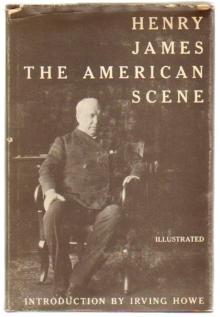 The American
The American The Wings of the Dove, Volume 1 of 2
The Wings of the Dove, Volume 1 of 2 Frost at Midnight
Frost at Midnight Morning Frost
Morning Frost The Portrait of a Lady — Volume 1
The Portrait of a Lady — Volume 1 Fatal Frost
Fatal Frost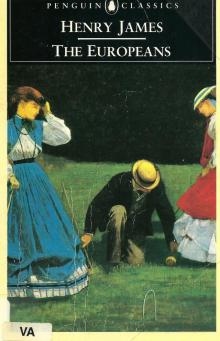 The Europeans
The Europeans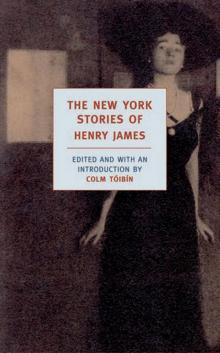 The New York Stories of Henry James
The New York Stories of Henry James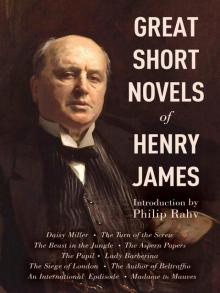 Great Short Novels of Henry James
Great Short Novels of Henry James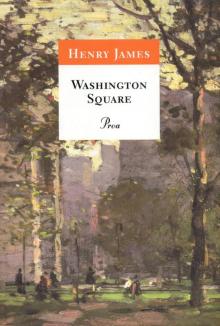 Washington Square
Washington Square The Portrait of a Lady — Volume 2
The Portrait of a Lady — Volume 2 The Ambassadors
The Ambassadors The Wings of the Dove
The Wings of the Dove The Princess Casamassima (Classics)
The Princess Casamassima (Classics) The Coxon Fund
The Coxon Fund First Frost
First Frost Henry James
Henry James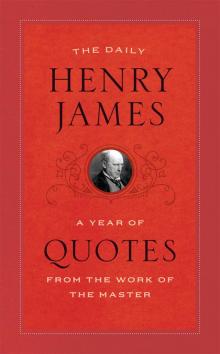 The Daily Henry James
The Daily Henry James Travels With Henry James
Travels With Henry James The Reverberator: A Novel
The Reverberator: A Novel What Maisie Knew (Henry James Collection)
What Maisie Knew (Henry James Collection)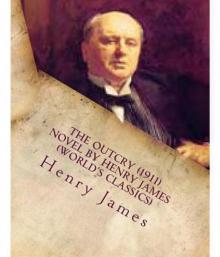 The Outcry
The Outcry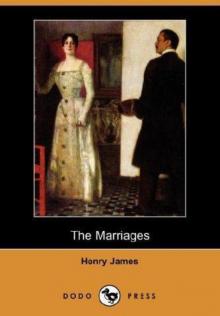 The Marriages
The Marriages The Wings of the Dove, Volume 2
The Wings of the Dove, Volume 2 The Bostonians, Vol. I
The Bostonians, Vol. I The Outcry: -1911
The Outcry: -1911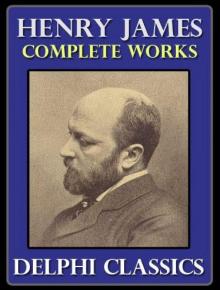 The Complete Works of Henry James
The Complete Works of Henry James Letters from the Palazzo Barbaro
Letters from the Palazzo Barbaro The Pupil
The Pupil The Bostonians, Vol. II
The Bostonians, Vol. II Pandora
Pandora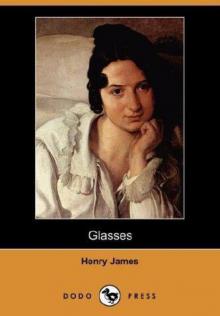 Glasses
Glasses The Princess Casamassima
The Princess Casamassima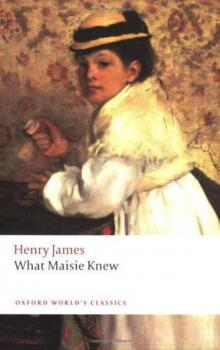 What Maisie Knew
What Maisie Knew The Reverberator
The Reverberator The Golden Bowl - Complete
The Golden Bowl - Complete Confidence
Confidence Wings of the Dove (Barnes & Noble Classics Series)
Wings of the Dove (Barnes & Noble Classics Series) The Spoils of Poynton
The Spoils of Poynton